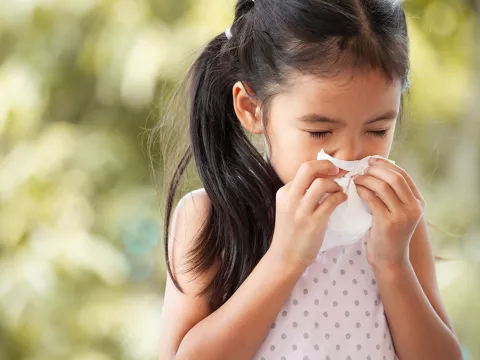- UChicago Medicine AdventHealth
- and Alphi Elackattu, MD, FACS

Choose the health content that’s right for you, and get it delivered right in your inbox.
Sniffling, sneezing, watery eyes and coughing. We’ve all been there. What starts as a tickle in the throat or a sneeze here or there can quickly turn into symptoms that last for days — sometimes weeks. But as common as these symptoms are, it can be hard to tell what exactly is causing your congestion.
With the changing seasons in the Chicagoland area, your symptoms might be allergies. We asked UChicago Medicine AdventHealth Medical Group’s ear, nose and throat specialist, Alphi Elackattu, MD, FACS, to explain the differences.
“Allergies are not caused by a virus or bacteria,” says Dr. Elackattu. Instead, allergy attacks are caused when your immune system overreacts to an allergen like pollen, pet dander or dust mites. Your body releases too many histamines, which cause symptoms such as:
- Coughing
- Nasal congestion
- Runny nose
- Sneezing
- Sore throat
- Watery eyes
Allergies are even more common than a cold. Dr. Elackattu explains, “It’s estimated that more than 50 million Americans suffer from some type of allergy. Seasonal allergies may occur when allergens are present at certain times of the year (trees in spring, grass in summer, ragweed in fall). Some individuals suffer from environmental allergens, such as dust, mold or animal dander, which are present year-round.”
You can ease your seasonal allergies by avoiding contact with allergens. For instance, limit your time outside when pollen counts are high. Over-the-counter medications such as Claritin or Zyrtec and nasal sprays can help, too.
How Can I Tell if It’s Allergies, a Cold or COVID-19?
“Allergies, colds and the coronavirus may be caused by different sources, but their symptoms are similar,” says Dr. Elackattu.
This handy list can help you tell the difference:
You might have allergies if:
- Mucus is clear
- Symptoms include itchy eyes, rashes, nasal congestion or sneezing
- Symptoms last longer than 10 days (with no fever)
- Symptoms worsen during certain times of year, after being outside or when leaving windows open
- You notice “allergy shiners” (dark undereye circles)
You might have a cold if:
- Symptoms last all day long and are worse in the morning and at night
- You begin to feel better after seven to 10 days
- Your symptoms include fatigue, body aches, fever and a sore throat
Coronavirus variants tend to have similar symptoms, but there are some notable differences, and the severity of symptoms is unique to each person.
- Symptoms typically develop between two and five days after a person is exposed to the virus, and they typically last a few days to a few weeks
- Common symptoms include dry cough, fatigue, fever, sore throat, body aches, headache, loss of taste or smell, rash on skin, or discoloration of fingers or toes
- Serious symptoms include chest pain or pressure, difficulty breathing or shortness of breath
Seek immediate medical attention if you have serious symptoms.
We’re Here to Help

Alphi Elackattu, MD, FACS, is a board-certified otolaryngologist or an ear, nose and throat (ENT) physician. He sees children, adolescents, adults and older adults. He’s accepting new patients at his Carol Stream and Hinsdale offices.
Call 630-861-6275 for more information or to schedule an appointment.